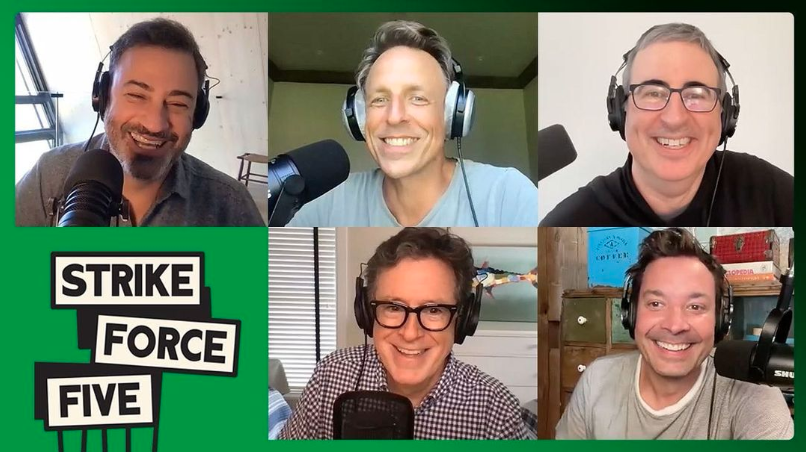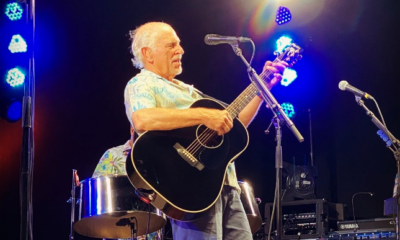NEWS
Late Night Hosts Launch ‘Strike Force Five’ Podcast To Support Striking Staff
Published
1 year agoon

Courtesy of strikeforcefive/Instagram
With writers and actors still on strike, the hosts of the five major late night shows — Stephen Colbert, Jimmy Fallon, Jimmy Kimmel, Seth Meyers and John Oliver — launched a podcast on Wednesday.
The “Strike Force Five” podcast will be a limited series on Spotify, with all proceeds earned by the hosts going to out-of-work staff on their programs: “The Late Show with Stephen Colbert,” “The Tonight Show Starring Jimmy Fallon,” “Jimmy Kimmel Live,” “Late Night with Seth Meyers,” and “Last Week Tonight with John Oliver.”
According to a press statement announcing the series, the podcast grew out of weekly meetings among the hosts, as they discussed the ongoing Hollywood strikes.
“Kimmel, Meyers, Fallon, Colbert, and Oliver want to ‘pay it forward’ as it were in order to give back to the community that allows them to do what they do,” said Rob Weiner, Popular Culture Librarian at Texas Tech University. “To make a comparison to music, this is a supergroup, and media attention the hosts are receiving for the podcast is not undeserved.”
Some 160,000 actors represented by SAG-AFTRA went on strike July 14, joining more than 11,000 writers in the film and television industry on the picket lines for the first double strike since 1960.
SAG-AFTRA and the Writers Guild of America each voted to strike after their respective contract negotiations broke down with the Alliance of Motion Picture and Television Producers (AMPTP), which represents studios including Netflix, Amazon, Apple, Disney, Discovery-Warner, NBC Universal, Paramount and Sony.
In a statement announcing the writers’ strike, which began on May 2, the WGA said “the companies’ behavior has created a gig economy inside a union workforce.”
“From their refusal to guarantee any level of weekly employment in episodic television, to the creation of a ‘day rate’ in comedy variety, to their stonewalling on free work for screenwriters and on AI for all writers, they have closed the door on their labor force and opened the door to writing as an entirely freelance profession,” the WGA said.
“Everyone is so afraid that AI will replace human scriptwriting. It is only a tool which used properly could enhance some aspects of the writing,” Weiner said.
The use of artificial intelligence is also a sticking point for actors, who object to the studios’ desire to own AI scans of actors and use them in perpetuity without consent or compensation for each use.
At a press conference announcing the strike, SAG-AFTRA’s chief negotiator, Duncan Crabtree-Ireland, revealed that studios “proposed that our background performers should be able to be scanned, get one day’s pay, and their companies should own that scan, their image, their likeness and should be able to use it for the rest of eternity on any project they want, with no consent and no compensation.”
At the same time, striking actors and writers are fighting back against the low pay for streaming movies and shows, and lack of residuals. Viewership for streaming content is not typically revealed by streamers, unlike TV ratings or box office numbers, and those working on the most successful streaming content do not get residual compensation commensurate to similarly successful projects in traditional TV and film.
“You cannot change the business model as much as it has changed and not expect the contract to change too,” SAG-AFTRA President Fran Drescher said in an impassioned speech announcing the strike. “We’re not going to keep doing incremental changes on a contract that no longer honors what is happening right now with this business model that was foisted upon us.”
TV personality and pop culture expert Brian Balthazar said there is a “huge misconception that actors are all rich and famous.”
“The reality is that the majority of [SAG-AFTRA] members don’t make the $26,000 annually to be eligible for heath benefits. People are in dire straits, and every dollar this podcast raises will go to families that are in increasingly desperate need right now,” Balthazar said.
“Networks might like us to look at these five hosts as rivals, but the truth is, they’re showing up for not only each other, but the acting and writing community,” Balthazar said. “The promise of financial support could make a difference in how long and strong SAG-AFTRA members can stand for their demands.”
TMX contributed to this article.
Related Topics:

More Movies + TV Shows
-


Dive Tank is Displayed by US Navy during Fleet Week…
-


Smash Mouth Singer Steve Harwell Dead At 56
-


Crowds Flock to See Warship Uss Bataan as it Docks…
-


Snoop Dogg and Grimes Drop Exclusive ZASH NFTs Straight From…
-


Kim Kardashian and Pete Davidson Are Spotted Going for Dinner…
-


Prince Louis jubilee tantrum reveals his special bond with mom…
-


Bruce Springsteen Postpones September Concerts To Recover From Peptic Ulcer…
-


Hollywood legend Greta Garbo’s former NYC apartment hits the market
-


Jimmy Buffett’s Cause Of Death Revealed To Be Rare Form…
-


Kendall Jenner and Devin Booker Get Back to Normal After…
-


Halle Berry Says Doctor Mistook Perimenopause Symptom For Herpes
-


The Sydney Opera House Flares to Light After Long Hiatus
